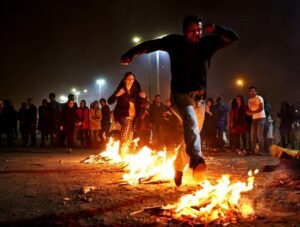
Aakhri Charshumba – The Last Wednesday in the Month of Safar
As a child, I remember my mother would give away pulses and cash in Sadaqah or charity to the poor on the day of Aakhri Charshumba – the last Wednesday in the month of Safar (Safar is the second month of the lunar based Islamic calendar).
Although this custom is not widely practiced, many Muslims hold on to the belief that it was on this day that Prophet Mohammed (Peace Be Upon Him) had recovered from a long spell of illness and performed Ghusl-e-sehat(ritual bath upon recovery of sickness) and had gone out of the city of Madinah to take a stroll. In continuance of this tradition it is common among the Muslims of the Indian subcontinent to take a bath and go to parks with families and celebrate.
The word aakhri means Last and Charshumba means Wednesday. So, the words aakhri Charshumba or aakhri Budh translate to “last Wednesday”. This article studies the significance of this tradition of celebrating the last Wednesday of the month of Safar (the second month of the Islamic calendar).
Aakhri Charshumba is celebrated in some parts of India, Pakistan and Bangladesh. It is celebrated as Mandi Safar in Malaysia and Rebo Wekasan in Indonesia. What is interesting to note here is that although there are vast differences between the cultural practices in the different countries where it is being practiced, the day that it is practiced on, that is, the last Wednesday of the month of Safar, remains the same everywhere.
In Malaysia, the Mandi Safar ritual involves taking a bath in the water that has been recited and blessed with the Salamun verses of the Quran. (Irmawati Sagala, 2018). The Rebo Wekasan of Indonesia is also observed in a similar way.

The ceremonial aspects of Aakhri Charshumba are similar in nature in both, the South Asian countries of India, Pakistan and Bangladesh and the Southeast Asian countries of Malaysia and Indonesia. They revolve around celebrating and going out; in the South Asian countries it means going to the parks and in the Southeast Asian countries it involves going to beaches for the ritual bath.
Cultural traditions or rituals like the Aakhri Charshumba that have existed from a long time might not be mentioned in the Quran and the Hadith, but are still part of a mystical or spiritual conscience of the pre-Islamic times. They came upon with the cultural intermingling of the different practices of the geographical regions with Islam.
The trade practices that existed between the South Asian (India) and Southeast Asian regions (Malaysia, Indonesia) (Mohd Noh Abdul Jalil et.al. 2019) may be one of the reasons for the similarities in the way Aakhri Charshumba is celebrated across these distant regions.
In Iran, another variant “Chaharshanbe Suri” , also known as Persian festival of fire is celebrated on the last Wednesday of the month of Safar where people perform the ritual of jumping over the fire and say: “Give me your beautiful red colour and take back my sickly pallor! (sorḵī-e to az man, zardī-e man az)” with the hope that it will ward off misfortunes. This ritual is an amalgamation of the Iranian rituals practised during the ancient times with Islam, and very distinct from the way the day is celebrated in South Asia and South East Asia.

It may be noted, however, that these rituals have been called by some schools of Islam to be pagan beliefs, that have existed before the arrival of Islam. The Wahabis (conservative muslim sect originating in Saudi Arabia) call it ‘bidah’ or ‘shirk’ to follow or participate in this ritual as there is no mention of it in the Quran. This ritual is seen as an innovation and departure from the ‘Puritan Islam’ by some. Puritan Islam involves direct interpretation of the Quran and the, Hadith when it comes to dealing with religious practices. Also, the followers of Ahlus Sunnah wal Jama’at sect (or the people of Sunnah and the Majority who mainly believe in the traditions and practices of Prophet Muhammed) claim that there is no mention of the ritual in the Quran and Hadith. So, within the Muslim community we see people supporting, and certain others criticising, the ritual of Aakhri Charshumba.
For Muslims who have been following Aakhri Charshumba, the tradition has mostly been passed down by their ancestors and is continued as a mark of respect to the cultures and traditions that were followed. It is a common belief among the Muslims of these regions that the month of Safar is full of calamities and disasters. Many Muslims avoid undertaking any major activities, travel, weddings, etc., during the month of Safar. As such, Aakhri Charshumba is also celebrated with the belief that the practise of recitation of Quranic verses, and going out as did by the Prophet (PBUH) would safeguard them and their family members from the disasters, that may befall them in the coming year.
Does following the ritual of Aakhri Charshumba mean that Muslims who follow it should be labelled as sinners? Well, that is for God to decide; what is right and wrong and who is a sinner and who is not. Islam has long thrived for being receptive and accepting towards people belonging to diverse cultures. These people would invariably have cultural practices distinct from what religious text may prescribe. Muslims in the South Asian and Southeast Asian countries embraced these cultural practices. A form of syncretic religion paved the way to a wonderful amalgamation of distinct cultural forms one of which is Aakhri Charshumba.
References:
Irmawati Sagala 2018, Extension of Religious Ritual Functions in Development Process: Study of Mandi Safar in Air Hitam Ocean Indonesia, IOP Conf. Ser.: Earth Environ. Sci.156 012009
Mohd Noh Abdul Jalil, W Mohd Azam Mohd Amin and Majdan Alias. 2019. Politico-cultural-religious milieu of SouthEast Asia: An examination of pre-Islamic structures of authority and syncretic practices. KEMANUSIAAN the Asian Journal of Humanities 26(Supp. 1): 109–129. https://doi.org/10.21315/kajh2019.26.s1.6
(The views expressed in this article are the author’s own. Content can be used with due credit to the author and to ‘Zariya: Women’s Alliance for Dignity and Equality’)

Salma Kouser-Asif is an M.A. in Political Science and M. Phil. in South Asian Studies from Jawaharlal Nehru University in New Delhi, India. She is pursuing a PhD in comparative assessment of climate policies of India and China. Her broad interests are in studying the history and politics of the South Asian region. And, in assessing the impacts of national and international policies of any particular country or region.
Hindi Version Post

Salma Kouser-Asif is an M.A. in Political Science and M. Phil. in South Asian Studies from Jawaharlal Nehru University in New Delhi, India. She is pursuing a PhD in comparative assessment of climate policies of India and China. Her broad interests are in studying the history and politics of the South Asian region. And, in assessing the impacts of national and international policies of any particular country or region.



